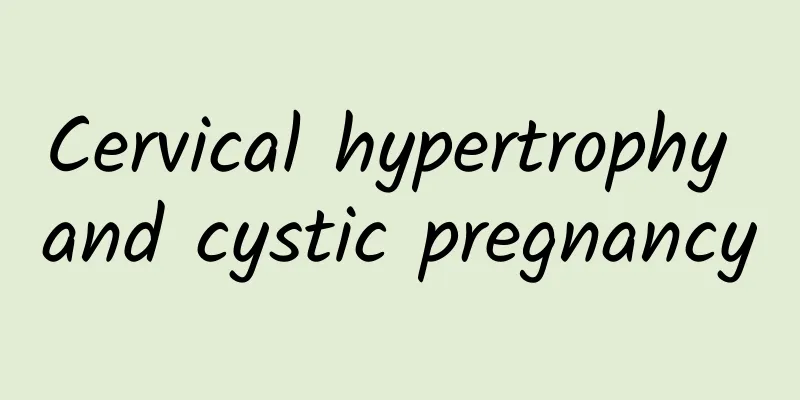Cervical hypertrophy and cystic pregnancy

|
Cervical hypertrophy with cysts does not necessarily affect pregnancy, but its impact on fertility needs to be judged based on the specific situation. Mild cervical hypertrophy usually does not hinder pregnancy, but severe cases may interfere with sperm passage or embryo implantation and require timely diagnosis and treatment. Cervical hypertrophy is mainly caused by chronic inflammation, endocrine disorders or blockage of cervical gland secretion. Cervical cysts are small cysts formed after cervical gland blockage. Generally, there are no obvious symptoms, but if the cysts are too large or there are many of them, they may cause abnormal leucorrhea, lower abdominal discomfort and even menstrual disorders, thus affecting the chance of pregnancy. In terms of treatment, mild and asymptomatic cervical hypertrophy and cysts do not require special treatment and can be followed up and observed through regular gynecological examinations. If the symptoms are severe or affect pregnancy, physical therapy (such as laser or freezing), minimally invasive surgery (cervical circumcision), and drug therapy (such as antibiotics and anti-inflammatory drugs and endocrine regulating drugs) can be considered to relieve cervical hypertrophy, discharge cystic fluid and eliminate lesions. Surgery is usually performed after the doctor evaluates the condition, and further trauma to the cervix is avoided. Cervical hypertrophy is mainly caused by chronic inflammation, endocrine disorders or blockage of cervical gland secretion. Cervical cysts are small cysts formed after cervical gland blockage. Generally, there are no obvious symptoms, but if the cysts are too large or there are many of them, they may cause abnormal leucorrhea, lower abdominal discomfort and even menstrual disorders, thus affecting the chance of pregnancy. In terms of treatment, mild and asymptomatic cervical hypertrophy and cysts do not require special treatment and can be followed up and observed through regular gynecological examinations. If the symptoms are severe or affect pregnancy, physical therapy (such as laser or freezing), minimally invasive surgery (cervical circumcision), and drug therapy (such as antibiotics and anti-inflammatory drugs and endocrine regulating drugs) can be considered to relieve cervical hypertrophy, discharge cystic fluid and eliminate lesions. Surgery is usually performed after the doctor evaluates the condition, and further trauma to the cervix is avoided. During the period of preparing for pregnancy, not only should related lesions be treated, but also one's own physical conditioning should be strengthened, such as enhancing nutritional balance, especially supplementing folic acid to prevent abnormal fetal neural tube development and improve the body's anti-inflammatory ability. During treatment, avoid sexual intercourse and self-medication to avoid irritating the cervix and prolonging recovery time. A follow-up examination is required 3 months after surgery to ensure that the cervix is healing well. If conception is still unsuccessful after multiple treatments, other possible fertility problems should be further investigated and a reproductive medicine specialist should be consulted for help. |
<<: Is there a genetic factor for cervical hypertrophy?
>>: On which day should I go for a checkup for abnormal leucorrhea?
Recommend
Can endometrial tuberculosis kill you?
Will endometrial tuberculosis kill you? The answe...
Nursing record for threatened abortion
What should we pay attention to in the care of th...
Experts talk about precautions for medical abortion
Medical abortion is very convenient and quick for...
It's always itchy down there, but it can't be cured by just washing
I am usually very clean and pay attention to hygi...
Does pelvic inflammatory disease cause buttock pain? It may cause
The main symptom of pelvic inflammatory disease i...
What should I do if I have stomach pain the day after a miscarriage? See what the doctor says
Spontaneous abortion feels abdominal pain. If the...
Experience with prescriptions and medicines for the treatment of amenorrhea
Amenorrhea refers to the pathological absence of ...
Is it possible to treat cervical erosion without surgery?
Is it possible to treat cervical erosion without ...
Understand the symptoms of vulvar leukoplakia
Understand the symptoms of vulvar leukoplakia. Lo...
What are the types of dysmenorrhea?
Many women experience dysmenorrhea symptoms durin...
What should I do if I can't hold back from having sex 15 days after abortion?
If you cannot hold back from having sex 15 days a...
There is a magic weapon to lower cholesterol and promote metabolism! 5 Health Benefits of Enoki Mushrooms You Must Know
Enoki mushrooms are very nutritious, high in prot...
How to treat second-degree cervical erosion in women? Do women need surgery for cervical erosion?
How to treat the second degree of cervical erosio...
What is the transmission route of pelvic peritonitis?
Whether the disease is contagious is a concern fo...
Does women urinate blood after menopause?
If a postmenopausal woman has blood in her urine,...









